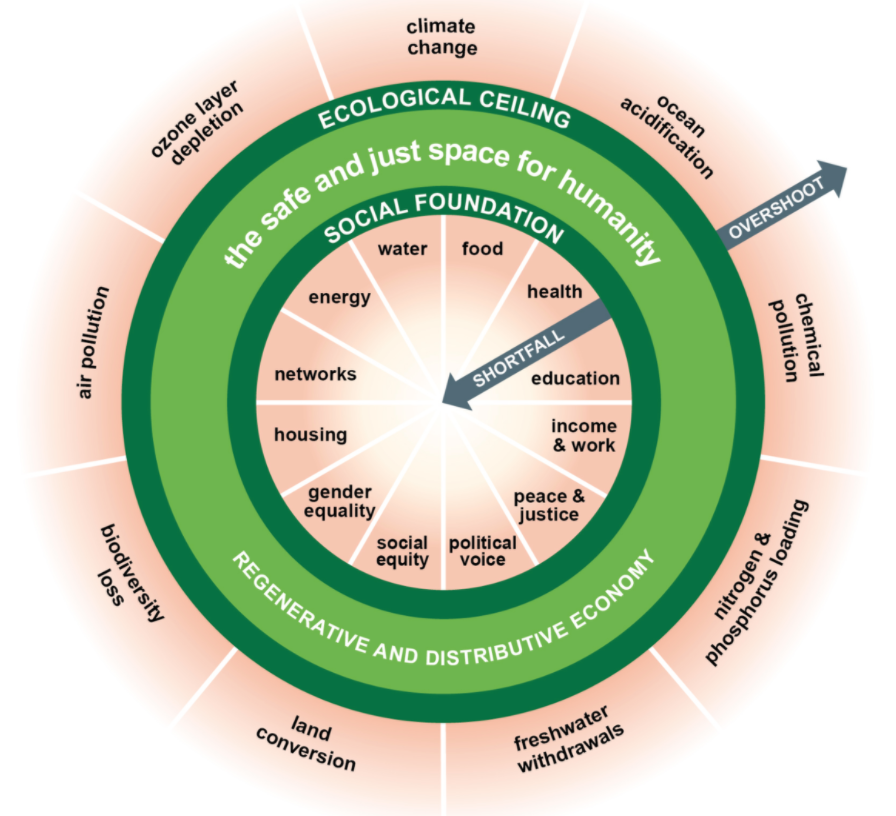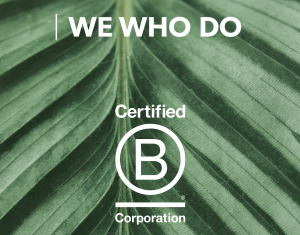Companies everywhere are rightly focusing on “greening” their products and making their operations more environmentally friendly. Decarbonization and waste management are absolutely essential, but many companies don’t recognize that sustainability is not just about the environment. For your company’s actions to be truly sustainable, you need to consider social sustainability as well.
What do doughnuts have to do with sustainability?
One useful tool to consider when incorporating social sustainability into your business operations is Kate Raworth’s “doughnut” theory. The theory, which has long been applied to development, presents a unified vision of social and environmental sustainability. It acknowledges that economic activity causes some base level of environmental damage, and that this damage can be justified because it enables a “social foundation.”

Raworth states that “the social foundation forms an inner boundary, below which are many dimensions of human deprivation. The environmental ceiling forms an outer boundary, beyond which are many dimensions of environmental degradation. Between the two boundaries lies an area – shaped like a doughnut – which represents an environmentally safe and socially just space for humanity to thrive in.”
Nearly all businesses have negative environmental effects: they deplete natural resources, cause pollution, or use shared public space (even fully online businesses!). Environmental sustainability seeks to keep businesses operating below the “ecological ceiling,” mitigating the amount and severity of this environmental damage.
Social sustainability acknowledges that some level of economic activity is necessary to create a baseline social foundation in which humans can thrive, and seeks to ensure that this foundation is equitable and sustainable.
To apply the doughnut theory to your business requires taking a step back and asking yourself:
- What harm are we doing?
- What good are we providing?
- Is the tradeoff worth it for all of our stakeholders, not only our customers and shareholders, but also the communities in which we operate and society at large?
In addition to helping you develop your sustainability strategy, this exercise can help you clearly articulate your purpose and your sustainable value proposition.
Social sustainability in practice
While companies may create products that contribute to the social foundation, things like health, education, and housing are not the responsibility of the private sector; it is the role of the state to ensure that those needs are met. And so, one of the most important actions you can take to contribute to social sustainability is also one of the simplest: pay taxes! In order to operate within the doughnut, you need to ensure that gains from your business are distributed equitably among the communities in which you operate, and the best vehicle to do so is by compensating the state to provide social services.
Tax avoidance – through legal and illegal means – is far too common. Amazon sparked public outrage in the U.S. when it asked state governments to compete for the location of its second headquarters using tax incentives, and ended up with an offer of $3 billion in tax breaks and financial incentives from New York. (Notably, community organizers rallied and Amazon backed out of the deal, and later opened corporate offices in New York without the excessive tax breaks.)
The same “race to the bottom” happens globally: governments compete for business by charging tax rates so low that they go below the social foundation level of the doughnut, no longer properly compensating communities for their detrimental effects. This global tax base erosion is the impetus behind the OECD’s proposed global minimum corporate tax rate.
Multiplying your influence
Paying taxes responsibly takes more than individual actors. When companies pay their own taxes, they make their own positive impact. When you call out bad actors, advocate for fair tax practices, and bolster government efforts to reign in tax evaders, you can have a multiplying effect, ensuring that companies across your industry contribute to social sustainability. As Ynzo van Zanten recently told the We Who Do Insights team, “collaboration is the new competition.” In addition to the positive sustainability benefit, this also has the effect of preserving a fair playing field in which your competitors are not cutting costs by avoiding tax.
In certain sectors, such as the extractives, companies can have a transformative effect on the communities where they operate when they work with governments to publish their operating contracts. This transparency allows citizens to examine governments’ tax revenue and compare it to local expenditures on public goods. It empowers communities to hold their governments accountable and fight against corruption.
Beyond taxes
Beyond taxation, companies can contribute to social sustainability both within their own company – applying health and safety standards, promoting diversity and inclusion, paying a living wage, and ensuring pay equality – and also within their supply chains. Here, too, you can have a multiplying effect if your suppliers and vendors are located abroad. You can apply health and safety standards, while also advocating for those standards to be universally adopted. You can support technology transfer and economic empowerment by ensuring that employees throughout your supply chain are not only trained to execute a particular action necessary for production, but also gain broader skills. By paying a living wage, you can help reduce extreme poverty and global inequality.
The exact steps you take will differ depending on your sector and your supply chain, but pursuing activities that contribute to the “social foundation” is a good place to start.
The business case for social sustainability
As efforts towards environmental sustainability are increasingly ubiquitous, a company whose sustainability lens includes social impact can reap another benefit: competitive advantage. As George Serafeim observed in the Harvard Business Review, “some companies implement environmental-, water-, or waste-management systems in order to operate more efficiently… Typically, competitors can quickly follow suit and acquire similar systems.” Along with Ioannis Ioannou of London Business School, Serafeim “analyzed data from close to 4,000 companies globally, [and] found that… firms are increasingly engaging in the same sorts of sustainability and governance activities – and thus failing to differentiate themselves strategically.”
By recognizing that environmental sustainability is linked to social sustainability and taking meaningful steps towards these broader objectives, companies can distinguish themselves to consumers who are increasingly discerning and demanding sustainable business practices. Social sustainability also has the advantage of overlapping with risk mitigation.
Summary
Sustainability is about more than just the environment. Companies can differentiate themselves from their competitors when they consider sustainability in its broadest terms and incorporate social responsibility into their practices. By operating within the “doughnut theory” of development, contributing to a positive social foundation through taxes and equitable social policies and mitigating their environmental impacts, companies can ensure that their actions have a sustainable impact on their staff, their suppliers, their communities, and the world.
About the Author:
Colleen King is a Co-founder and Executive Director of New Global Perspectives, a website that showcases sustainable and equitable solutions to global challenges. She previously worked in the Obama Administration and as Chief of Staff of the Natural Resource Governance Institute. She is also a valued WeWhoDo member








